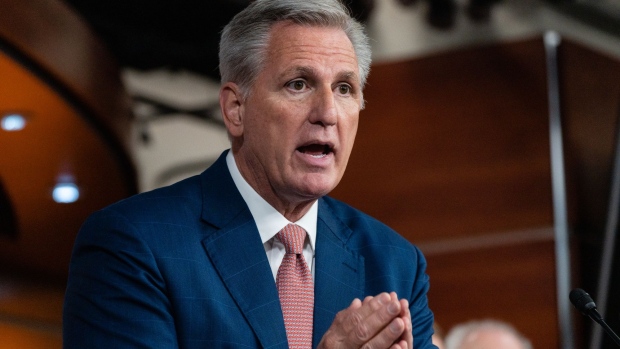Sep 23, 2022
McCarthy Lays Out Agenda for GOP in Midterms and His Campaign for Speaker
, Bloomberg News

(Bloomberg) -- House Republican leader Kevin McCarthy unveiled a broad populist agenda Friday aimed in part at cementing his standing within a restive GOP caucus that is eager to take power after the November election and in no mood for compromise.
With Republicans likely poised to be in control of the House next January -- though by a smaller margin than forecast earlier this year -- McCarthy, 57, has positioned himself to replace Democrat Nancy Pelosi in the speaker’s chair.
He’s closely aligned himself with former President Donald Trump, who maintains the loyalty of many House Republicans, and has spent much of the year campaigning and raising money for GOP candidates to solidify his position.
But McCarthy still will have to navigate an often fractious House Republican caucus, particularly the far-right wing of the GOP that bedeviled the last two GOP speakers with a preference for gridlock over bending on principles. McCarthy’s “Commitment to America” is meant as a unifying rally point for the party.
McCarthy dismissed questions about whether the aim of the agenda, besides setting a campaign framework, was also to help solidify his standing as speaker-in-waiting.
“Everybody is so caught up about speaker. This is not about that,” he said in an interview after the agenda was rolled out at an event in suburban Pittsburgh. “This is about putting the conference together, uniting the conference on policy. Telling the American public exactly what you represent.”
Asked whether he wants the speaker’s job, McCarthy replied: “Oh yeah.”’
McCarthy’s “Commitment to America” purposely invokes Newt Gingrich’s 1994 “Contract With America,” which led to Republicans sweeping into a House majority and Gingrich ascending to speaker. Gingrich joined McCarthy at a closed-door unveiling of the agenda for House Republicans on Thursday.
Its broad strokes include traditional GOP focal points, such as government spending and economic strength, but it also is designed for a Republican Party shaped in the image of Trump, with an emphasis on crime, border security and social issues. It also promises investigations of President Joe Biden’s administration.
During the public announcement McCarthy was flanked by colleagues representing a wide swath of the House GOP, from far-right Georgia Representative Marjorie Taylor Greene to New York Representative John Katko, one of 10 House Republicans who voted to impeach Trump after the insurrection at the US Capitol and isn’t seeking re-election.
“I wanted to be here for this because I think it is important for people like me -- usually the conservatives, that right range in our conference, doesn’t show up for things like this,” Greene, a member of the ultra-conservative Freedom Caucus, said. “I want to have a seat at the table.”
But even as McCarthy works to unify his party, members of the House Freedom Caucus -- which now numbers about 30 representatives, including some of Trump’s most devoted allies -- already are presenting demands for changes in GOP conference rules that could make his job more difficult.
Those include re-instituting a parliamentary mechanism known as a “motion to vacate,” which allows any House member to call for the removal of the speaker. That maneuver played a role in prompting Speaker John Boehner, a Republican, to retire in 2015 amid dissent from the Freedom Caucus.
There also is a push to restore a so-called “majority of the majority” rule to prevent a speaker and other party leaders from bringing legislation to the floor for a vote that is not supported by a majority of the Republican conference. That rule strained Boehner’s speakership, and could give conservatives out-sized legislative influence, particularly if Republicans win only a narrow majority.
“Those kind of notions are totally disruptive to the institution, disruptive to the Republican conference, as well,” said Representative Guy Reschenthaler, who represents the Pennsylvania district where Friday’s event took place.
Representative Scott Perry, a Trump ally from Pennsylvania who is set to continue next year as chairman of the Freedom Caucus, described the “Commitment to America” as something the entire Republican conference could support, though “we might want to add some things.”
When asked whether McCarthy is the right person to lead the House, Perry deflected, saying only: “We are focused on winning the majority.”
Representative Warren Davidson, a Ohio Republican and Freedom Caucus member said “There’s nobody even running against McCarthy right now.” But he added that no matter who becomes speaker, “Fundamentally, we want to see regular members have a bigger voice. None of those running for Congress are campaigning that they should come here to Washington and follow orders.”
But Josh Huder, a senior fellow at Georgetown University’s Governmental Affairs Institute, said apart from “a general right-wing distrust” of McCarthy, “any Republican speaker will have trouble if the right flank continues its history of obstruction.”
“Funding the government, raising the debt ceiling, and other routine legislation have split leaders from their rank and file,” Huder said. “Leaders responsibility to pass these bills to avoid threats to the nation’s credit damage their standing with the right flank. As long as that dynamic continues Republicans leaders will struggle to keep their jobs or maximize their majority’s potential.”
McCarthy’s presentation of an agenda stands in contrast to the approach of Senate Republican leader Mitch McConnell, who wants the party to put the spotlight on the record of Biden and congressional Democrats.
Indeed, Democrats quickly seized on the “Commitment to America” to highlight how Republicans will approach issues.
Pelosi released a statement saying, “ this extreme MAGA agenda is way out of step with Americans’ priorities, who align with Democrats’ vision of putting People Over Politics: with lower costs, better-paying jobs and safer communities.”
©2022 Bloomberg L.P.






